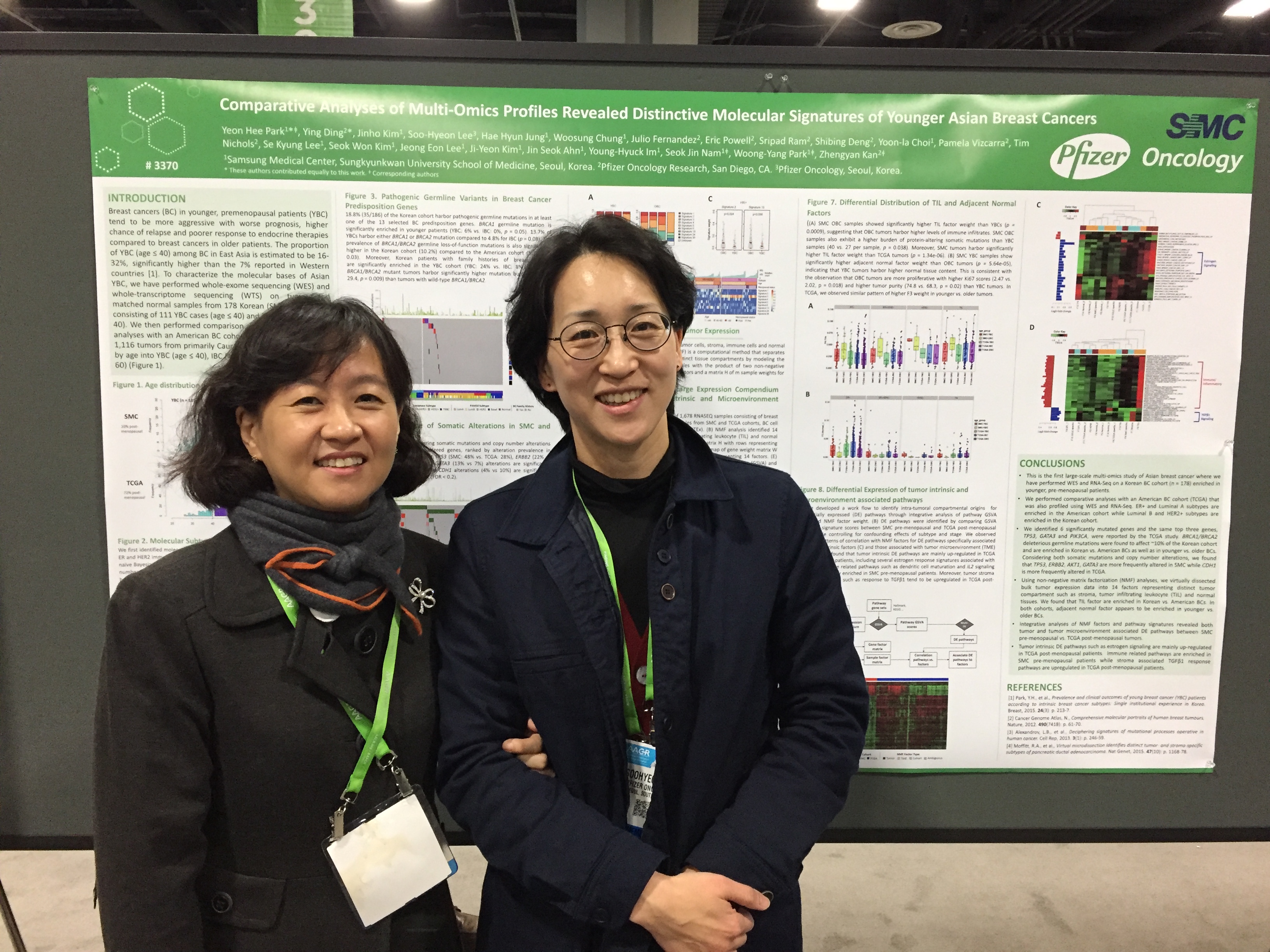Using ‘Omics to Understand the Rise in Breast Cancers Among Young Asians

By Get Science Staff - This article originally published on Get Science
Asian women, compared to their counterparts in western countries, are diagnosed with breast cancer at earlier ages and face a worse prognosis.
In an effort to better understand this patient population, scientists from Pfizer and Samsung Medical Center (SMC) in Seoul, Korea, have embarked on a multi-phase project to do multi-omic profiling of the tumors of some 187 younger Korean breast cancer patients. Multi-omics refers to using whole exome (DNA) and transcriptome (RNA) sequencing as well as other molecular profiling approaches to better understand a tumor and its surrounding environment. The partnership marks an unprecedented level of multi-omics data generated from young Asian breast cancer patients.
The research originated with Dr. Yeon-hee Park, an Associate Professor in SMC’s Department of Hematology-Oncology, who wanted to better understand the characteristics of younger breast cancer patients in Korea. "For Asian women, breast cancer is a terrible disease that can strike at a relatively early age,” said Park. "This study will hopefully serve as a stepping stone to the development of new therapies with the understanding of Asian young breast cancer patients deepening to a molecular level.”
Pfizer researchers were also keen to looking at post-treatment tumors and the impacts of immuno-oncology, so the first phase of the Pfizer – SMC collaboration began with an analysis of the young patient breast cancer data. “We really want to better understand whether these patients have distinctive breast cancer biology or simply a different distribution of the intrinsic subtypes, and how we should treat them,” says Zhengyan “George” Kan, an Associate Research Fellow at Pfizer’s research site in La Jolla, California. Currently, patients are screened for three known subtypes of breast cancer when they’re first diagnosed.
The unique “molecular signature” of Asian breast cancer
One reason why collecting data on Asian patients is important is because in the Asia-Pacific region nearly half of breast cancer patients are pre-menopausal. That is counter to the data in western countries, where only 15 to 30 percent of breast cancer patients are pre-menopausal. Breast cancers in younger patients tend to be more aggressive and often require a unique form of treatment. For example, younger breast cancer patients may not respond as well to standard endocrine therapies as older patients.
Doctors on the ground in Korea, such as Soo-Hyeon Lee, saw the need for better treatments for younger Asian breast cancer patients. “The challenge for the doctors treating these younger Asian breast cancer patients is they have to follow the standard medical regimens that more or less focuses on older breast cancer patients in the United States, or other developed countries,” says Lee, Pfizer's Medical Director, Oncology Landscape in Developed Asia and Japan.
Earlier genomic and molecular profiling studies have significantly advanced our understanding of the different subtypes of breast cancers. Research done primarily in Caucasians has shown that tumors in young and older breast cancer patients have unique “molecular signatures,” suggesting that distinct biological and molecular mechanism may have contributed to tumor formation. In addition, previous studies have shown that genomic and gene expression differences exist between varying races.
But to date, this level of ‘omics data was not available to characterize younger Asian breast cancer patients, says Kan. The Pfizer/SMC research team has been the first to conduct such a robust multi-omic analysis of a large group of Asian patients.
By using multi-omic profiling scientists have determined that the cancer tumors among this young Korean cohort have a unique “molecular signature,” or distinct biological and molecular behavior. For example, cells can experience damage to DNA from a variety of sources, and when that damage goes unchecked, or when DNA repair mechanisms are faulty, that damage can lead to oncogenic, or cancer-causing mutations. The different types of DNA damage that occur, and the different repair mechanisms, are one part of DNA’s “signature.” Through genetic analysis, Kan and his team identified several mutation signatures that were more prevalent in the Asian breast cancer cohorts. These include deficiencies in DNA repair mechanisms, echoed by a further observation that the younger Asian patients have a higher frequency of loss-of-function mutations in the BRCA1 and BRCA2 genes, which play important roles in DNA damage repair. This is important, as tumors with BRCA1 or BRCA2 mutations and deficient DNA repair mechanisms may be sensitive to PARP inhibitors.
Understanding unmet needs at the molecular level
When cancer patients undergo treatment, the genetic profiles of their tumors often change and can impact how a tumor will respond to therapy. In the second phase of the project, researchers are looking at multiple tumor samples of Korean breast cancer patients before, during and after chemotherapy before surgery to see if any genetic changes take place. “These profiling studies will help to give us more of an in-depth understanding of how some of these therapies work and may allow us to intervene early with suitable combinations of therapies, ” says Samir Lal, a post-doctoral research fellow in oncology translational research based at Pfizer’s La Jolla research site.
In a final phase, which has just kicked off, the team is doing multi-omic profiling for Asian breast cancer patients whose tumors no longer respond to standard treatments. The lack of response is referred to as “resistance,” and is a major cause of cancer death.
“It’s an unmet medical need,” says Kan. “It’s critical that we really figure out at the molecular level what is giving rise to these acquired resistances. Once we know this we can attempt to develop combination therapies to attack the cancers or preemptively prevent this resistance.”
Dr. Yeon-Hee Park, left, of Samsung Medical Center (SMC), and Dr. Soohyeon Lee, right, of Pfizer. The two scientists are among a group of US-Korea collaborators from SMC and Pfizer who have embarked on a multi-omic profiling project of the tumors of younger Korean breast cancer patients.
![]()






